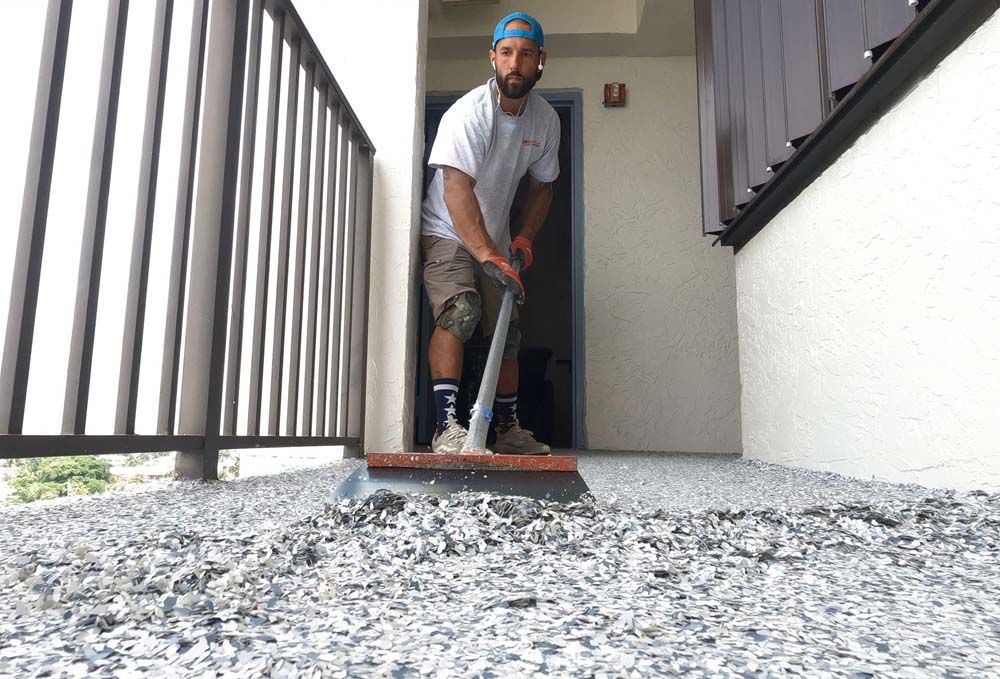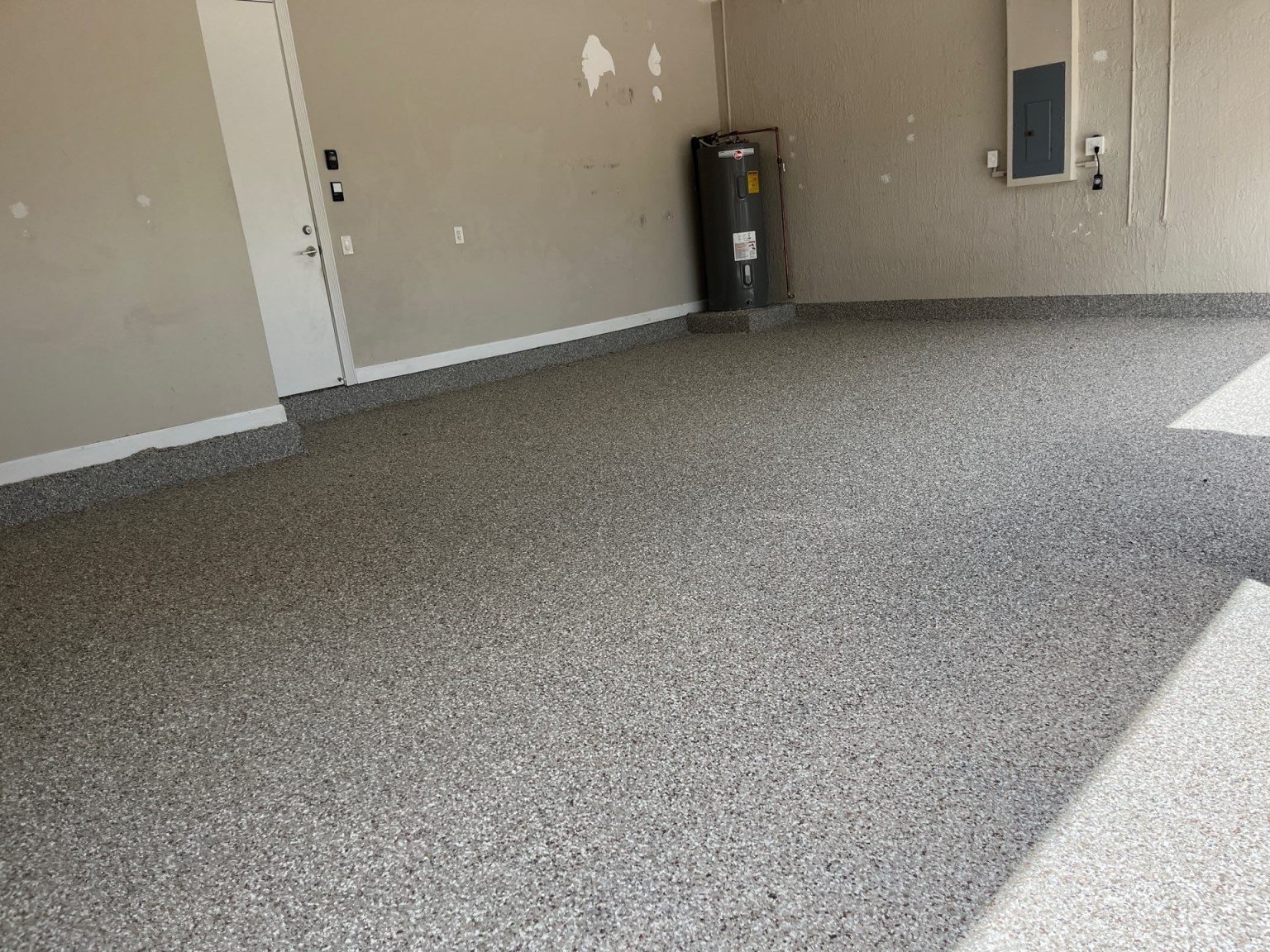Selecting the perfect concrete coating for your space is a crucial decision, as it represents a significant investment in both time and money. Making the wrong choice could lead to unexpected problems down the line. In this comprehensive guide, we’ll compare two popular options: Epoxy and Polyurea, to help you make an informed decision.

Choosing the Right Concrete Coating: Epoxy vs. Polyurea
Unveiling the Basics: Epoxy and Polyurea Demystified
Before delving into the comparison, let’s understand the fundamental differences between epoxy and polyurea. Epoxy is a polymer known for its elasticity and toughness, widely used in construction. It forms a surface layer on concrete, similar to paint, without binding deeply. Epoxy is often chosen for its ability to create a strong, adhesive bond with concrete, providing a durable and protective layer that can withstand various environmental stresses.
Polyurea, on the other hand, is both a polymer and an elastomer, exhibiting rubber-like properties. Highly customizable, it offers varying levels of hardness, making it an excellent choice for concrete coating. Unlike epoxy, polyurea penetrates deeply into the concrete, creating a molecular bond that results in a more flexible and resilient surface. This flexibility allows polyurea to accommodate structural movement and thermal expansion without cracking or peeling, making it ideal for environments with significant temperature fluctuations.
Durability: Epoxy’s Tenacity vs. Polyurea’s Resilience
Epoxy Durability
Epoxy is renowned for its durability, effectively withstanding tire marks, chemicals, stains, scratches, and general impacts. However, its longevity can be affected by factors like heat and UV exposure. Epoxy coatings can become brittle and yellow over time when exposed to sunlight and high temperatures, which may reduce their lifespan and aesthetic appeal. Additionally, epoxy can be prone to chipping and cracking under heavy impact or frequent use, which may require periodic repairs or reapplication.
Polyurea Durability
Polyurea surpasses epoxy in durability, owing to its elastomeric nature. It is not only more flexible but also chemical-resistant, making it an ideal choice for areas with potential spillage. Polyurea’s flexibility allows it to absorb impacts better without cracking, and its resistance to UV rays ensures it maintains its appearance and integrity even under prolonged sun exposure. The ability of polyurea to withstand extreme temperatures, heavy loads, and aggressive chemicals makes it a preferred choice for industrial and commercial settings where maximum durability is essential.
Outdoor Application: Epoxy vs. Polyurea
Epoxy for Outdoor Use
Both coatings can be applied to outdoor concrete surfaces, but there are considerations to keep in mind. Epoxy coatings may require specialized formulations for UV resistance, temperature fluctuations, moisture resistance, and proper surface preparation. Even with these formulations, epoxy may still degrade over time when exposed to the harsh outdoor environment. In addition, epoxy coatings can be slippery when wet, which might pose a safety risk in outdoor applications such as pool decks and patios.
Polyurea for Outdoor Use
Polyurea, however, is inherently UV-resistant, making it a superior choice for outdoor applications. It’s an excellent option for patios, pool decks, driveways, and sidewalks. Its ability to withstand extreme temperatures and moisture without compromising its structural integrity makes it a reliable and durable solution for any outdoor setting. Polyurea’s quick curing time also allows for faster project completion, minimizing downtime and disruptions during installation. Moreover, polyurea can be formulated with non-slip additives to enhance safety in wet conditions, making it an ideal choice for outdoor areas that require both durability and slip resistance.
Longevity and Cost: Making a Value-Driven Choice
Epoxy Longevity and Cost
Epoxy coatings typically last three to five years, necessitating more frequent recoating. This can potentially lead to higher costs over time. Although epoxy might seem more budget-friendly initially, the need for regular maintenance and recoating can add up, making it less cost-effective in the long run. Additionally, the labor and materials required for frequent touch-ups and repairs can contribute to the overall cost, further diminishing the initial savings.
Polyurea Longevity and Cost
In contrast, polyurea boasts a lifespan of approximately 15 years, offering significant long-term value. While polyurea requires a higher initial investment, its extended durability and minimal maintenance needs justify the cost, providing long-term peace of mind and savings. The long-lasting nature of polyurea ensures that you won’t need to worry about frequent touch-ups or replacements, making it a more economical choice over time. Furthermore, the superior performance and aesthetic retention of polyurea coatings can enhance the overall value of your property, making it a worthwhile investment.
Additional Benefits of Polyurea Coatings
Quick Curing Time
One of the standout features of polyurea coatings is their rapid curing time. Unlike epoxy, which can take several days to fully cure, polyurea sets within a few hours, allowing for faster project completion and minimal disruption to your daily activities. This quick turnaround is especially beneficial for commercial and industrial settings where downtime can have significant financial implications.
Environmental Considerations
Polyurea coatings are often more environmentally friendly compared to traditional epoxy coatings. Polyurea formulations can be low in volatile organic compounds (VOCs), reducing harmful emissions and contributing to better indoor air quality. This makes polyurea a safer choice for both installers and occupants, aligning with the growing demand for eco-friendly building materials.
Enhanced Aesthetics
Polyurea coatings offer a wide range of aesthetic options, including various colors, finishes, and textures. Whether you prefer a high-gloss finish, a matte look, or a textured surface for added slip resistance, polyurea can be tailored to meet your specific design preferences. The ability to customize the appearance of your concrete surfaces enhances the visual appeal of your space, making polyurea an attractive option for both residential and commercial applications.
Choosing the Right Concrete Coating for You
Selecting between epoxy and polyurea hinges on your specific needs and goals. For those seeking a durable, long-lasting solution with minimal upkeep, polyurea emerges as the superior choice. Its resilience, UV resistance, and flexibility make it ideal for both indoor and outdoor applications.
Regardless of your selection, professional installation is paramount. At 24 Hour Floor, we stand by the quality and longevity of our polyurea concrete coating, backed by a 15-year product warranty. Our commitment to quality craftsmanship and top-tier products ensures lasting results that you can trust.
Schedule Your FREE Consultation Today
Interested in a concrete coating with 24 Hour Floor? Schedule your FREE consultation today and let our experts help you choose the best solution for your needs. Invest in a flooring solution that combines functionality, durability, and aesthetic appeal, ensuring your space looks and performs its best for years to come.
By understanding the key differences between epoxy and polyurea, and considering factors such as durability, application, longevity, and cost, you can make an informed decision that meets your specific requirements. Trust 24 Hour Floor to provide you with premium concrete coating solutions that stand the test of time.
Contact Us today to learn more about our services and how we can help you achieve the perfect concrete coating for your space. With our expertise and dedication to quality, you can enjoy the benefits of a beautifully coated concrete floor that enhances the functionality and appearance of your home or business.



